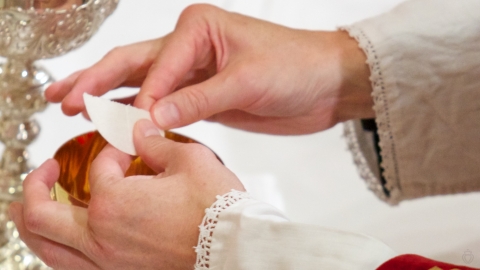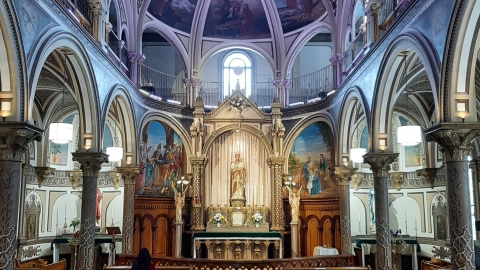De Jure or De Facto Schism in Germany?
The “synodal path” currently being held in Germany—where the revision of Catholic morality on homosexuality, the celibacy of priests, ministries of women must be discussed—compels the most lucid observers to ask the question about a schism under the law (de jure), when an actual schism (de facto) is already there.
German Bishops with "Autocephalism"
In the January 28, 2020 edition of Il Giornale, under the title The Church is now in danger: a schism threatens Europe, Francesco Boezi writes: “‘Schism’ remains an unspeakable word for the Catholic Church. However, for some time now, we have been writing and talking constantly about ‘schism.’ While approaching one of the most complex phases of this pontificate, the revolution of the curial structures on the occasion of the publication of the new apostolic constitution through which Jorge Mario Bergoglio intends to revolutionize the Roman order, the German bishops have convened an ‘internal council’ [i.e., ‘synodal path’- NDLR] lasting two years. The watchword is only one: reform. The potential effects, on the other hand, are manifold. The German prelates have decided to pursue a path that may result in ‘binding decisions.’”—Even if these [decisions] were the initial demands of the German Central Committee of Catholics, it must be recognized that the statutes of the synodal path are withdrawn on this point, probably as a result of Roman intervention. Nevertheless, the bishops will be morally obligated to apply the resolutions they have accepted.
Francesco Boezi shows the gravity of the situation by pointing out the first topic of study, in chronological order of the synodal path: The Catholic doctrine on homosexuality. Homosexuality is presented by the German reformers as “a normal form of sexual predisposition.” Therefore, “in looking at it more closely, the whole of sexual morality risks being subject to global change.” And they have brought up other topics that could become “binding decisions”: “In Germany, there seems to be fertile ground for the abolition of priestly celibacy, for the establishment of a female diaconate, and for the secularization of the management of parishes.”
Therefore, a question arises: What will be the Pope’s attitude toward such a radical challenge? The Italian journalist advances one possibility: “In less than two years, Jorge Mario Bergoglio may have to deal with a kind of case unique in recent ecclesiastical history: a local Church that has declared itself autocephalous or almost autocephalous, and which then informs the Vatican that it has deliberated in favor of ‘binding decisions.’ And if, as some ‘traditionalists’ think—according to Mr. Boezi—there is a collusion between Pope Francis and Cardinal Reinhard Marx, president of the German bishops’ conference, “the Argentine pontiff would be in a rather thorny situation: saying no to Cardinal Marx would break the progressive front; saying yes to Cardinal Marx, and thus to the ‘binding decisions,’ would constitute a weighty precedent. In the latter case, other episcopal conferences may then feel empowered to organize their own ‘internal councils.’ And that would create the problem of the return of national churches. With all that, the ‘binding decisions’ would lead to doctrinal confusion.”
In support of a possible progressive schism, the vaticanist reports what, in his eyes, is a significant fact: on January 24, Cardinal Gualtiero Bassetti told reporters in his diocese of Perugia: “If someone does not like this pope, he says it, because he is free to choose other ways. Criticism is fine, but not this will to destroy.” And again: “There are too many people talking about the pope and I said to one of them: Become evangelical, if the Catholic Church does not suit you, if this boat is too confining. Our Protestant brothers have neither pope nor bishop, each one makes his own choices.”
And Francesco Boezi commented: “Bassetti, with this reflection, certainly did not intend to make a reference to the Germans, whom the Pope likes, but precisely to the so-called ‘anti-Bergoglians.’ The Italian cardinal’s words carry remarkable weight. If only because they indicate how, in the high Catholic spheres, some are prepared to lose numerically, in order to recover a unity of vision that seems to have been lost.”
This is why a statement has already been made: “a de jure schism, one that is recognized by the institutions, is one thing; a de facto schism, one that does not need to be baptized with all the official blessing, since it is moving forward on its own, is another. Bishop Luigi Negri [former Archbishop of Ferrara], in an interview with La Verità [January 13], sounded the alarm, by speaking about the presence of schismatic situations in the universal Church.”
Towards an Ecclesiastical Tax Strike?
Francesco Boezi continues by noting an opposition to the “synodal path” which is emerging: “There are three German cardinals who seem more than perplexed: Gerhard Ludwig Müller, former prefect of the Congregation for the Doctrine of the Faith, Walter Brandmüller , historian and friend of Benedict XVI, and Cardinal Rainer Maria Woelki, who voted against the creation of an ‘internal council.’ Also the usual traditionalist circles, which organized a real protest rally in a Bavarian square, with the presence of the former apostolic nuncio Carlo Maria Viganò.”
Regarding Cardinal Woelki, Archbishop of Cologne, we can note that after the first meeting of the ‘synodal path,’ held in Frankfurt on January 30, he immediately let it be known in a interview on Ingo Brüggenjürgen’s program on DomRadio.de: “ In fact, all my fears have been proven to be true. I made it very clear that I was very concerned that a quasi-Protestant church parliament would be set up here because of the way this event was planned and organized. For me, that’s what happened. The essential ecclesiological requirements which relate to the nature of the Catholic Church—in my opinion—are being ignored in many speeches. This is already the image that was very clearly formed when the bishops and the laity all entered together, thus expressing that all are equal. This has nothing to do with what the Catholic Church thinks.”
The high prelate even reported serious irregularities: “Not all the speakers had the right to speak. All requests for intervention that had been submitted in writing in advance were not given due consideration.” And to recall his position and those opposed to this synodal path: “We are not those who set up or reinvent the Church, two thousand years later: on the contrary, we are part of a long tradition. The faith, as defined during the Councils and also by its apostolic origins, cannot be in any way demolished or reinvented here.”
Francesco Boezi also refers to the demonstration organized in Munich, on January 18, by the association Acies ordinata where, among the participants was Archbishop Carlo Maria Viganò, who in 2018 denounced the Roman silence on Cardinal Theodore McCarrick’s bad behavior. The French journalist Jeanne Smits who was in Munich, writes: “Ranged like an army in battle, a hundred Catholics from near and far—Germany, Austria, Italy, France ... but also from the United Kingdom, Canada, the United States, thus begged the Virgin who is “strong as an army drawn up in battle” to pray to her divine Son to come to the aid of His Church open to the winds of error and attacked in an unprecedented way from the inside.”
On January 31, European correspondence reported that on this occasion Professor Roberto de Mattei “called on German Catholics to refuse to pay the Kirchensteuer, the church tax, which is compulsorily imposed on Germans, under pain of excommunication.” In his article in Il Giornale, Francesco Boezi stresses this call for a tax strike: “Professor Roberto de Mattei, president of the Lépanto Foundation, is the first to be convinced of the merits of a tax strike: “The criterion of belonging to the Catholic Church,” he emphasized in Bavaria, “is founded on the faith that every Catholic receives at baptism and cannot be reduced to the payment of a tax. Only a deeply secularized institution could establish an equation between belonging to the Church and paying a share of its revenues. The economically rich but spiritually poorer German Church appears in the eyes of Christians to be a corporate and bureaucratic apparatus subject to public opinion and civil authorities.”
The Church Is Already Experiencing a Schism
In an interview with Il Giornale on January 27, Aldo Maria Valli presented his latest book L’ultima battaglia (The Last Battle). It is a novel in which the Roman vaticanist imagines what the Church would become if the current reforms were pushed to their final theoretical and practical conclusions.
To the question “is this an allegory of the period that the Church is going through?” The Italian journalist replied: “This novel takes place in an indefinite future where certain tendencies of the present Church are taken to the extreme. Priests who can marry even between men, the message of faith reduced to a vague sentimental consolation, a total abandonment to the thinking of the world, the ban on praying and blessing in public, St. Peter’s square renamed Dialogue Place. And faced with this drift, someone decides to resist. [This] is the story of a Church deliberately sold to the world. Behind it is the plot of those who actually want to neutralize the Catholic Church. But not everyone is ready to surrender. A ‘small flock’ is organized and goes on the counter-attack. The enterprise seems impossible, but the good Lord will not fail to supply His providential help.”
Later in the interview, Aldo Maria Valli said: “Overall, we have a pope who speaks like the Secretary-General of the United Nations or the head of a globalist organization. It is often very difficult to find Catholic content in his preaching. But I find that the worst aspect of this pontificate is not related to a specific theme, but to the constant ambiguity, as we can see in the apostolic exhortation Amoris lætitia of 2016. Francis says that for him, it is more important “to initiate processes than to occupy space.” But what does this mean? Peter’s successor must confirm the faithful in the faith, he should not ‘initiate processes,’ whatever that means.”
Regarding a possible schism in Germany, the vaticanist replied: “There is already a schism. On the one side, a Church plagued by modernist heresies, on the other, Catholics who do not want to give in to the world. The German Church is economically very strong and capable of influencing other regions of the world, as we have seen in the case of the Synod on the Amazon. In many respects, such as priestly celibacy, and the female priesthood, a cardinal like Marx, president of the German bishops, has positions that are not really indistinguishable from those of the Lutherans. What is it, if not a de facto schism?”
Convert or Be Converted?
In the Nuova Bussola Quotidiana of February 10, Riccardo Cascioli also takes up the idea of a Vatican slavishly aligned with the discourse of the United Nations, and he assigns responsibility to, among others, Msgr. Marcelo Sanchez Sorondo, an Argentine prelate, Chancellor of the Pontifical Academies of Science and Social Science, “a true political activist, globalist, and socialist,” according to the Italian journalist who paints a severe picture:
“He has transformed the Pontifical Academies that he directs: respectable academic bodies called to discuss and deepen current scientific and social subjects, to give useful elements of knowledge to the popes, they have become the (scientifically) weaponized arm with a globalist and ecological thrust which certainly originates in Saint Martha’s [Pope Francis’ residence], but which in turn drags St. Martha’s. And the fact that he has become a fundamental pillar of the New Vatican Order is demonstrated by the fact that he is still there although he has already exceeded both the retirement age (75 years) and the extension which, in some cases, is granted by the Pope (two additional years).
“So in the Vatican, personalities have become at home representing the anti-human and anti-Christian thought that guides the UN agencies. Catastrophic ecologists, like John Schellnhuber, and neo-Malthusian economists, like Jeffrey Sachs, today dictate the line to follow, and even had to attend the erudite lessons of Paul Ehrlich, the environmental biologist best known for The Population Bomb, the book published in 1968 which so influenced anti-natalist policies of the following decades in poor countries.
“Sorondo is the Grand Master of this gang, convinced (or so he says) that he has brought the United Nations to the positions of the Church, while the opposite is evident. He feels so powerful and protected that he can freely make slanderous statements—he has repeatedly said that anyone who is skeptical about the theory of anthropogenic global warming is on the payroll of the oil companies—or throws out crazy talk that ridicules the entire Catholic Church and offends the victims of persecution. Remember that Pope Francis recently declared that China is the country that best implements Catholic social doctrine.”
Here Riccardo Cascioli cites a recent fact that illustrates the Vatican’s alignment with dominant thinking. This is the “conference organized by Bishop Sorondo, on the theme New forms of solidarity - Towards fraternal inclusion, integration and innovation. It took place on February 5, and among the keynote speakers was, once again, Jeffrey Sachs, who in his speech indulged in a long tirade against the American President Donald Trump, described as a mortal danger to the world, worse still if he wins the election next November.
“Obviously, there may be different opinions on the Trump administration, but getting the Holy See involved in such a political battle is absolutely unacceptable: especially since he thus takes the side of a birth control (and pro-abortion) theorist against the first American president to participate in a March for Life and who has been a champion of the right to life.”
In fact or in law, the schism does not seem to affect Germany; the Rhine and the Tiber have been mixing their waters for over 50 years. The break with the 2,000 year Tradition is accompanied by a rapprochement with the world—as the conciliatory aggiornamento wished. But today this rapprochement is becoming so narrow that it confines itself to an alignment on the positions of secular anti-Christian bodies. A return to Tradition is not going backwards, it is a vital issue for the Church: instaurare in Christo or be established in a NGO by the UN, in other words, transformed into a GMO, a genetically modified organism.
(Sources : Il Giornale/Correspondance Européenne/J.Smits/cath.ch/NBQ – trad. à partir de benoit-et-moi – FSSPX.Actualités - 28/02/2020)



